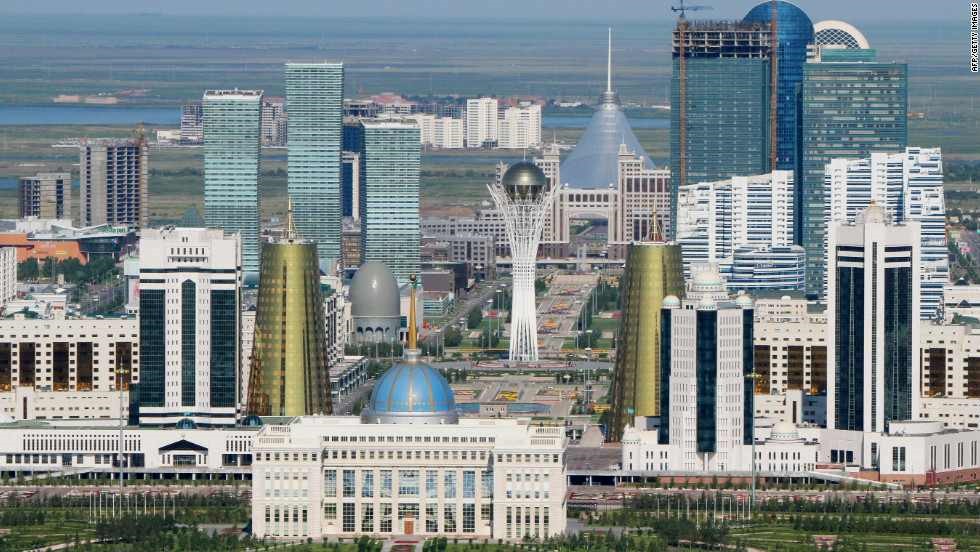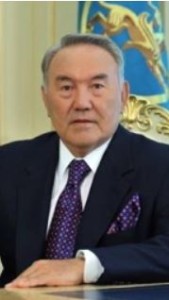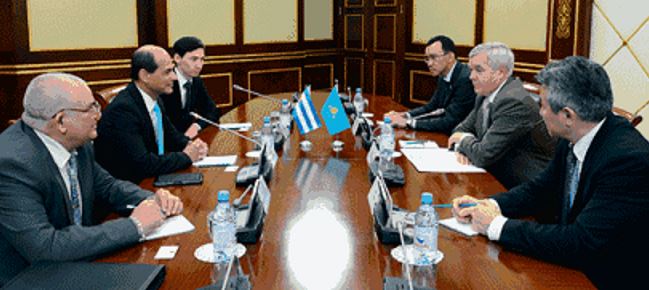
In Kazakhstan, Cuban diplomat promotes greater trade
Deputy Foreign Minister Rogelio Sierra Díaz traveled all the way to Kazakhstan this week to promote increased trade and cooperation with that Central Asian republic.
On Monday (June 29), he and ambassador Carlos Enrique Valdés met in the capital city, Astana, with Sergei Alexandrovich Dyachenko, deputy chairman of the Makhilis — the lower house of Parliament — and Maulen S. Ashimbayev, chairman of the Makhilis’ International Affairs Committee.

Also present was I. Tlegen, Kazakhstan’s chargé d’affairs in Havana. Kazakhstan does not have an embassy in Cuba but does have a consulate.
According to a report from the Kazakh news agency Kazinform, “Dyachenko stressed that cooperation between the two countries has great potential for development. According to the interlocutors, promising areas of cooperation include the oil and gas sectors, metallurgy, mining, agriculture, transportation and construction.”
The two countries have observed an economic cooperation agreement since March 2009 and a travel agreement since 2005.
Kazinform also reported that “the sides spoke in favor of the development of Kazakh-Cuban inter-parliamentary relations.”
In effect, Sierra Díaz was returning a visit to Cuba last year by Kazakhstan’s Deputy Foreign Minister, Yerzhan Ashikbayev, who met with him and Foreign Minister Bruno Rodríguez to discuss “cooperation issues in a bilateral format and within the United Nations and other international organizations.”
During Monday’s encounter, Dyachenko thanked Cuba for its support of Kazakhstan’s candidacy for non-permanent member of the United Nations Security Council in 2017-2018. Kazakhstan, which has never served in the Security Council, is a declared candidate for representative of the U.N.’s Asia-Pacific Group.
On Monday, Dyachenko informed Sierra Díaz about the preparation of the legislative framework for the implementation of the institutional reforms initiated by President of Kazakhstan, Nursultan Nazarbayev.

Nazarbayev was resoundly re-elected in April on the strength of what he called “five institutional reforms to strengthen our statehood.” Those basic reforms sound remarkably like those currently advocated in Cuba by President Raúl Castro Ruz.
- “The formation of the modern, professional and autonomous State apparatus, ensuring quality realization of economic programs and the provision of public services.”
- “Observance of the rule of law, guaranteeing property rights, creating the conditions for entrepreneurial activity, and the protection of contractual obligations, which will eventually become the basis for economic growth.”
- “Industrialization and economic growth, based on diversification.”
- “Unification on the basis of a common citizenship, the most reliable foundation for a sustainable and successful State.”
- “Transparency and accountability of the State.”
[Photo at top is an aerial view of Astana, Kazakhstan’s capital, which rises from the vast plains of Central Asia.]

